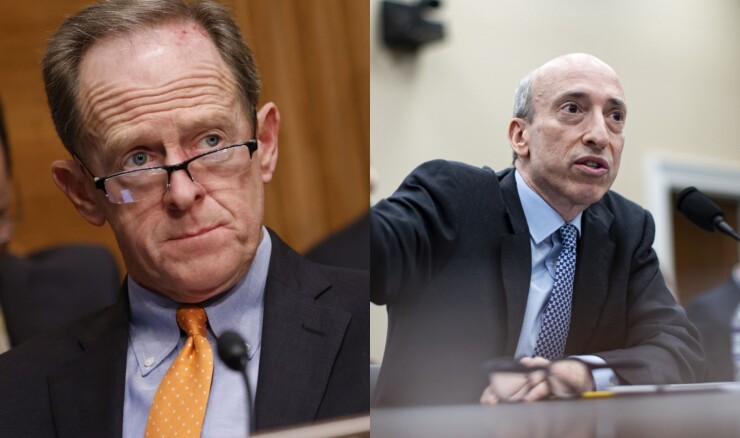WASHINGTON — The top Republican on the Senate Banking Committee told the chair of the Securities and Exchange Commission to expect the U.S. Supreme Court to eventually throw out the agency's landmark climate disclosure proposal on Thursday, accusing the markets regulator of overstepping its statutory bounds.
SEC Chair Gary Gensler was testifying before the committee on Thursday morning when Sen. Pat Toomey, R-Pa., argued that the climate disclosure rulemaking the agency
"The SEC may not want to answer to Congress on its climate disclosure rule, but ultimately, the SEC will have to answer to the courts — which should make it nervous," Toomey said, adding later: "The SEC should consider itself to be on notice by [the Supreme Court] that the separation of powers still exists and will be upheld."
The SEC's climate disclosure proposal would require public companies to calculate certain forms of their emissions and disclose potential exposure to climate risks, including from societal energy transition. As proposed, the disclosures would include
Banks have urged the SEC to retool its proposed approach to Scope 3 emissions, arguing that the regulatory burden

Gensler spent much of the hearing defending the SEC's climate disclosure proposal from criticism by Republican senators. Genlser argued that basic climate risk information amounts to "material" information as investors around the world have become more attuned to the long-term risks of climate change.
"It's material because — as the Supreme Court says, [there is] substantial likelihood that a reasonable investor is considering it significant in their mix of information," Gensler said, referring to
"It's really remarkable, what's happened in the last 10 to 20 years. So many investors are considering it, and why are they considering it?" Gensler continued. "They're considering it because there is a future chance of transition risk. They might have to change their operations. Laws might change."
Toomey's anticipation of support from the Supreme Court is notable for a sitting U.S. lawmaker, particularly in the absence of an actual legal challenge and before the agency rule has been finalized.
But the threat is also a testament to the considerable power of the Supreme Court's conservative supermajority, a Republican-appointed bloc of six justices that has acted aggressively in recent months to overturn long-running precedent in several areas, including
A decision narrowing the power of the Environmental Protection Agency could be enough for other industries, banking included, to push back against novel interpretations of regulatory powers.
Toomey pointed to a recent decision — West Virginia v. the Environmental Protection Agency — in which the Supreme Court ruled 6-3 to limit the ability of the EPA to direct certain power plants to reduce their emissions or adopt cleaner sources of energy.
That case rested on a legal theory sometimes called the "major questions" doctrine, in which jurists have argued that matters of political or economic significance should not be left to regulatory decision-making alone. West Virginia v. EPA was closely watched for years as a potential bellwether for how the Supreme Court will treat questions of federal agency authority and deference in the coming years.
"Among the factors [the Supreme Court] used to decide that something is a major question is [whether] it involved a novel approach, involved technical and policy expertise not traditionally needed by the agency," Toomey said. "Chairman, it looks to me that the climate you have proposed, under the major questions doctrine, just doesn't have the congressional authority."
Genser responded by saying that the SEC and its staff "take seriously the courts, particularly the Supreme Court."
Later, Gensler had a warning of his own for opponents of the climate risk disclosure framework: American courts would not be able to prevent European authorities from requiring U.S. firms with international footprints from complying with their own climate disclosure regimes.
"We want something here in the US [where] we adopt a rule and it's sustained in court, because if we don't, large U.S. issuers will probably have to comply with that European regime," Gensler said.






